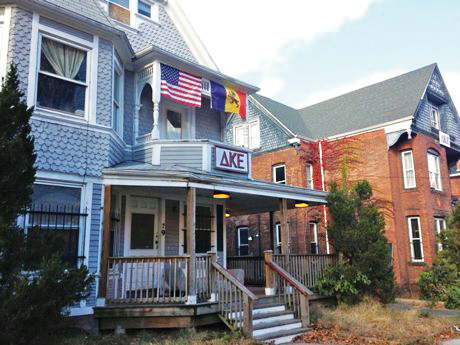
Yale Alumni Magazine
The Yale chapter of Delta Kappa Epsilon earlier this month asked the national DKE organization to investigate whether the culture of the Yale chapter promotes an unhealthy sexual climate.
The request for an investigation came in the wake of the suspension of the Yale chapter’s former president, Luke Persichetti, for sexual assault last school year, according to three people with knowledge of the case. DKE expelled Persichetti after Yale found he had broken Title IX rules on sexual misconduct, the people with knowledge of the case said. The fraternity will not hold any social events until the national organization’s investigation concludes, current DKE President Nicholas Hardy ’18 said in a statement.
“Our policy has been, and will continue to be, to expel any member who has been found to breach the University’s Title IX rules on sexual misconduct, without hindrance or delay,” Hardy said in the statement, which did not explicitly name any members of the fraternity. “This procedure has been aggressively followed because we are committed to doing our part in holding our members accountable, as an organization.”
In a statement Wednesday night, Persichetti acknowledged that last year he was a respondent to a complaint filed with Yale‘s University-Wide Committee on Sexual Misconduct.
“I really would like to share my side of the story. I also want to speak about the undisputed facts and other details surrounding the complaint. Unfortunately, I must return to Yale this year to complete my degree. Therefore, although the UWC has caused me and my family a great deal of pain, I continue to honor its expectation of confidentiality. It is clearly stated on the Yale Provost website and I encourage readers to examine it carefully,” Persichetti said in a statement to the News. “I do not want to dismiss the feelings of the complainant in any way. Though I deny many of the claims made, I respect this person and hope that she can find the same peace that I hope to find. I do continue to feel deeply let down by the UWC and the University at large. Serious decisions were made based on ambiguous facts. Worse yet, I have not felt protected or cared for since all of this began and that still hurts me more than I can put into words. I only hope that Yale can realize these mistakes and improve on their process in the future.”
Yale Vice President for Communications Eileen O’Connor declined to comment, saying the University does not confirm or deny the existence of Title IX investigations.
Doug Lanpher, the executive director of DKE, said the organization requires that all chapters hold themselves to a “high standard,” commended the Yale chapter for “proactively requesting an investigation from us” and said the investigation will happen.
In his statement, Hardy said the Yale chapter’s request for an investigation is part of an effort to improve transparency and accountability throughout the organization — and that the chapter’s executive board voted unanimously to request it.
Anna McNeil ’20, director of University affairs for Engender — a student group that addresses the role fraternities play in perpetuating an unsafe and sexually harmful social culture at Yale — expressed skepticism about the sincerity of DKE’s call for an investigation.
“Instead of meaningless gestures for the sake of the fraternity’s own image, DKE should end any and all practices of gender discrimination, including in membership,” McNeil said. “Investigations and committees have done nothing to redress these harms.”
DKE has grappled with issues of sexual misconduct in the past. In October 2010, DKE pledges filed into Old Campus, chanting “no means yes, yes means anal,” a line that sparked outrage on campus after the incident went viral.
After a six-month investigation, the Yale College Executive Committee imposed a five-year ban on DKE in May 2011. The penalties prevented the group from associating itself with Yale, holding on-campus events and using Yale email or bulletin boards to communicate with students.
While president of DKE, Persichetti told the News that the ban had effected positive change in the fraternity.
“I believe the sanctions had a positive impact on the culture of our fraternity,” Persichetti said in 2016. “Our current members understand the history of the ban and have played an important part in the cultural shift that has taken place since then.”
Last November, in the wake of the Persichetti incident, DKE commissioned an internal working group to address the issue of sexual misconduct on Yale’s campus.
“We will be making a full list of recommendations by the end of the month but so far, we have looked at ways to develop an even closer relationship with the Yale administration and student groups in providing additional training and workshops for members, participating in events sponsored by these campus organizations, and encouraging DKE members to serve in leadership positions on Boards of relevant organizations (for example, United Against Sexual Assault at Yale),” Ben Mallet ’19, a member of DKE who chairs the working group, said in a statement. “These organizations do an incredible job in combatting this issue and we want work with them even more closely to provide further training to help members serve as stronger allies in the fight against sexual misconduct.”
DKE, whose membership includes former Presidents George H. W. Bush ’48 and George W. Bush ’68, was founded at Yale in 1844.
Britton O’Daly | britton.odaly@yale.edu
This story is updated from a previous version that ran on Jan. 16, 2018.







